When do newborns start smiling? All about this lovely baby milestone
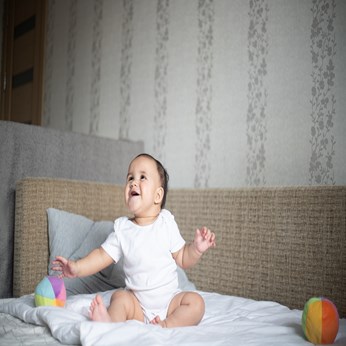
There's perhaps no moment more magical in early parenthood than witnessing your baby's first genuine smile. That heart-melting expression that seems to say "I see you, I know you, and I love you" can turn the most exhausting day into pure joy. But when exactly do babies start smiling, and how can you tell the difference between a real smile and those adorable (but involuntary) newborn expressions?
Understanding your baby's smile development isn't just about anticipating precious photo opportunities—it's about recognizing important developmental milestones that signal healthy growth and bonding.
The Timeline of Baby Smiles
Reflex Smiles (Birth to 6 weeks)
Those sweet little grins you might catch during your newborn's first weeks? They're likely reflex smiles, also called "sleep smiles." These happen involuntarily, often during sleep or when your baby is drowsy. While they're absolutely adorable, they're not yet social responses—think of them as your baby's facial muscles practicing for the main event!
Social Smiles (6 to 8 weeks)
The magic typically happens between 6 to 8 weeks when babies develop their first real, intentional smiles. These social smiles are responses to external stimuli—your voice, your face, or gentle interaction. You'll know it's the real deal because these smiles engage your baby's whole face, including their eyes, creating that unmistakable sparkle that makes your heart skip a beat.
Full-Blown grins (3 to 4 months)
By 3 to 4 months, your baby's smiles become more frequent, deliberate, and expressive. They'll start smiling at familiar faces, responding to silly sounds, and even initiating smile "conversations" with you. This is when the real fun begins!
How to Tell Real Smiles from Reflex Smiles
The Eye Test
Genuine social smiles involve the entire face. Look for crinkled eyes, raised cheeks, and that overall bright expression. Reflex smiles typically only involve the mouth area, while the eyes remain relatively unchanged.
Timing Matters
Social smiles happen during alert, awake periods when your baby is actively engaging with you. If your little one is asleep or drowsy and smiling, it's likely reflexive.
Response to Interaction
Real smiles are reactions to something—your voice, face, or playful interaction. Try talking to your baby or making gentle sounds. If they respond with a smile, you've likely witnessed the genuine article!
Encouraging Your Baby's First Smiles
Face-to-Face Time
Spend plenty of time making eye contact with your baby during alert periods. Position your face about 8-12 inches away (the optimal distance for newborn vision) and talk in gentle, animated tones.
Smile First
Babies are natural mimics. Smile frequently at your little one—your expressions teach them about facial communication and emotional connection. Your enthusiasm and joy are contagious, even to tiny humans!
Use Your Voice
Babies love the sound of their parents' voices. Sing, talk, make silly sounds, or read aloud. The combination of your voice and facial expressions creates the perfect environment for encouraging social smiles.
Create a Calm Environment
Babies smile more readily when they're comfortable, fed, and alert. Choose times when your baby is content and awake for your smile-encouraging interactions.
What If Your Baby Isn't Smiling Yet?
Every baby develops at their own pace, and the 6-8 week timeline is an average, not a strict rule. Some babies may not smile until closer to 10 weeks, especially if they were born prematurely. Factors like temperament, overall development, and even genetics can influence when that first social smile appears.
However, if your baby hasn't shown any social smiling by 3 months, or if you have concerns about their responsiveness and engagement, it's worth discussing with your pediatrician during a regular checkup.
The Emotional Benefits of Baby Smiles
Bonding and Attachment
Those early smiles play a crucial role in parent-child bonding. They signal that your baby is developing the ability to connect emotionally, creating a positive feedback loop that strengthens your relationship.
Communication Development
Smiling is one of your baby's first forms of communication. It's their way of saying "I'm happy," "I recognize you," or "Keep doing that!" These early social interactions lay the groundwork for more complex communication skills.
Parental Well-being
Let's be honest—those sleep-deprived early weeks can be challenging. Your baby's first genuine smile often comes at the perfect time, reminding exhausted parents why this whole parenting adventure is so incredibly worth it.
Capturing and Celebrating the Milestone
When that first real smile happens, you'll want to savor every second. Keep your phone camera ready (though don't stress about getting the perfect shot), and remember that the most important thing is being present for these precious moments.
Consider starting a milestone journal or photo album to document your baby's smile journey. These early expressions of joy become treasured memories that you'll look back on with incredible fondness.
Professional Support for Your Baby's Development
Understanding developmental milestones like first smiles is part of providing the best possible care for your little one. Having knowledgeable, experienced childcare support can make all the difference in recognizing and celebrating these precious moments.
Ready to ensure your baby receives expert, loving care during these crucial early months? Sulekha Care Services connects families with experienced nannies and childcare providers who understand infant development milestones. Our caregivers know how to encourage healthy development, recognize important moments like first smiles, and provide the nurturing environment your baby needs to thrive.
Take the next step toward your goals
Share your requirement and find the best care providers in your area
-
Looking for a caretaker’s job? Build your profile and get in touch with families in your vicinity.
-
Discover nannies, babysitters, cooks, housekeepers, pet sitters, and elder care under one roof.
-
Get all the support you need to run a successful care center.
-
Search for appropriate centers near you depending on your needs.
Care Corner Insights: Blog Library

Elder Care in Toronto: How to Find Trusted, Loving Support for Your Aging Loved Ones
"Toronto’s Ultimate Guide to Elder Care: Because They Deserve the Best—And So Do You!" 1. The Urgent Need for Elder Care in Toronto "Toronto’s senior population is growing fast—by 2026, 1 in 4 Torontonians will be over 65 (City of Toronto, 202

Compassionate Homecare: Your Trusted Partner in Vancouver
In today’s fast-paced world, ensuring loved ones receive the care they need can be overwhelming, especially if they require assistance due to age, illness, or disability. Sulekha Care Services offers a solution that eases this burden, connecting care

Navigating Elder Care in Toronto: A Guide for Families Seeking Peace of Mind (and Top-Notch Care!)
The Growing Need for Elder Care in Toronto "Toronto’s aging population is booming—by 2026, 1 in 5 Torontonians will be over 65 (City of Toronto, 2025). With families balancing careers, kids, and life’s chaos, finding reliable, compassionate elder ca
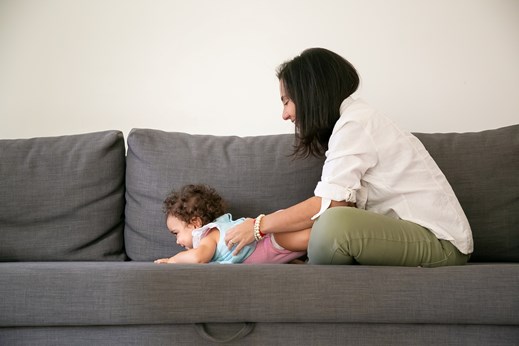
Finding the Right Nanny or Babysitter in Vancouver
Because Your Child Deserves More Than “Just Help” Raising a child in a vibrant city like Vancouver is beautiful—but let’s be honest, it can also be overwhelming. Between work schedules, school timings, and daily responsibilities, parents often find

7 Expert-Approved Tips to Hire and Manage a Nanny the Smart Way
Hiring a nanny is one of the most important decisions for any family. You’re trusting someone with your child’s safety, emotional well-being, and daily growth. Whether you're a first-time parent or hiring again, the process becomes much easier when y
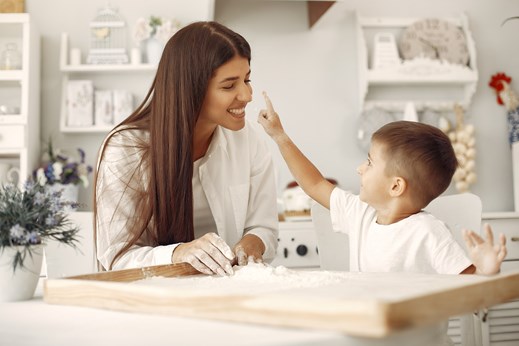
Finding Your "Mary Poppins" in the 6ix: The Stress-Free Way to Childcare in Toronto
Toronto is a city that never stops. From the bustling corridors of the Financial District to the vibrant neighborhoods of Scarborough and Etobicoke, life in the GTA is a beautiful, fast-paced whirlwind. But for parents, that whirlwind often comes wit
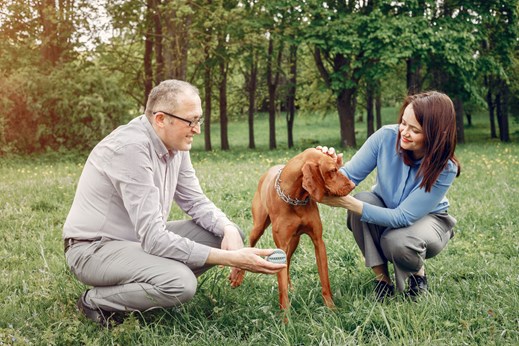
Because They’re Family: Finding Loving Pet Care When You’re Away
Pets Aren’t Just Pets. They’re Home. From wagging tails that erase bad days to gentle purrs that stitch silence into comfort, pets are emotional anchors. When life pulls you away—work trips, emergencies, or long hours—the biggest worry isn’t who wil

Because Your Pet Deserves More Than Just Care
Finding Trusted Pet Care Providers with Sulekha Care Services Pets aren’t hobbies. They’re family members with fur, feathers, whiskers, and very strong opinions about meal timings. Whether it’s a wagging tail greeting you at the door or a cat preten
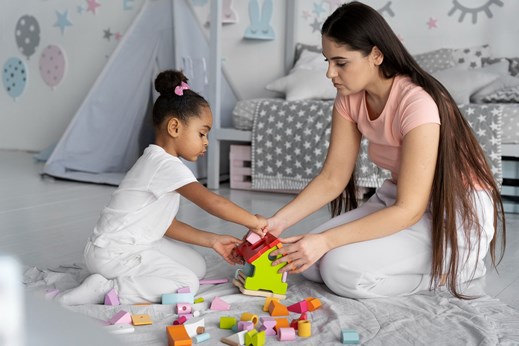
Why Toronto Parents Prefer Home-Based Childcare
A Warm, Trusted, Toronto-Style Approach to Raising Little Ones For parents in Toronto, finding the right childcare isn’t just a task—it’s an emotional decision. This city moves fast, hums with energy, and thrives on diversity, but its parents want s

Best Child Care Hacks for Busy Indian Moms and Dads in the U.S.
Balancing work, home, and parenting is challenging, especially for Indian parents living in the U.S. Between cultural expectations, school schedules, extracurricular activities, and household responsibilities, managing daily life can often feel overw